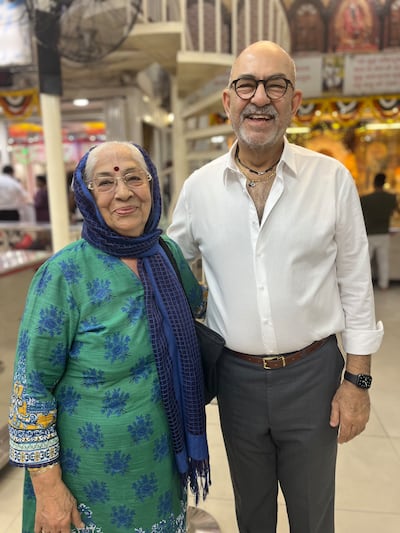Emotions ran high as worshippers arrived at the 65-year-old Hindu temple in Bur Dubai on Tuesday evening to offer their prayers “one last time” before it closed on Wednesday.
They can now visit the new temple in Jebel Ali, which opened on October 22.
Built in 1958 in Bur Dubai’s Old Souq, the Sindhi Guru Darbar temple complex, housing Bur Dubai Shiv Temple and the gurdwara, where Sikhs worship, served as a spiritual sanctuary for hundreds of thousands of Hindu worshippers and tourists.
“I am heart-broken,” Chandra Sachdev, 65, from Mumbai told The National.
A Bur Dubai resident whose house is a 15-minute walk from the temple, Chandra Sachdev has been worshipping at the temple for more than 40 years.
“The temple has a special place in my heart forever. I used to come here twice a day. Every morning and evening. I wish it would stay here in Bur Dubai,” she said, before adding she was disappointed at the prospect of having to travel across the city to worship from now on.
“It is so far away. How will I go there every day?” said Ms Sachdev.
According to sources, the relocation is the result of safety concerns about the old temple complex as well as the inability to accommodate the growing number of visitors.
Increase in worshippers
What began as a small worship hall on top of a maze of small shops in the Old Souq, today the temple is a cultural centre hosting hundreds of devotees daily and on special occasions.
It is also a major tourist attraction with a labyrinth of narrow alleys lined with shops selling fresh flowers, garlands, and incense sticks, transporting visitors to the rich cultural tapestry of Dubai.

For many UAE residents, the temple has been an inseparable part of their life that offered spiritual foundation.
Abu Dhabi resident Srinivas Asapu drove all the way to Dubai on Tuesday evening with his wife Ratna and daughter Preethi to pray at his favourite temple before it closed.
“We did not want to miss the last chance. We were praying here for the last 24 years. It won’t be the same at the new place,” Mr Asapu from Andhra Pradesh told The National.
He said the hour and a half drive from Abu Dhabi never stopped him from coming to the temple regularly.
“It feels very personal. You feel so connected to the deity when you make offerings from such close quarters. I cannot imagine praying anywhere else,” he said.
The newly-built hand-carved temple in Abu Dhabi will be officially opened by Indian Prime Minister Narendra Modi next month.
The landmark white marble and pink sandstone structure already draws thousands of people from different faiths and nationalities who pray over and bless bricks used at the temple site in Abu Dhabi’s Abu Mureikha area.
But for many devotees, it wont be the same as the old temple in Bur Dubai.
Darshan Shastri, a priest who worked in the Shiva temple, told The National that there is “no bigger sorrow” than to see the temple close.
“I have been working here for the last eight years. For thousands of devotees, this temple has a special place in their lives,” he said.
“Thousands have found solace for their worries here. Everyone is sad beyond words.”
Hindu and Sikh temples coexist
The Bur Dubai Hindu temple complex is also one of the rare places where a Hindu temple and Gurudwara of the Sikh community coexist.
Hindus and Sikhs come in droves daily to offer prayers at their respective places of worship that sit adjacent to each other.
A steep spiral of steps takes worshippers to a heavily-decked prayer hall of the gurdwara where men and women have to cover their heads before they enter.
It is a rare experience to hear the Hindu chants and prayers reverberate in the hall downstairs, especially during the “Aarti” or lighting ceremony, while simultaneously the Sikh Kirtan (devotional songs) are played inside the prayer hall above.
Bur Dubai resident Kirpal Singh, 64, was among the early Sikh attendees who saw the temple transform from a small place of worship to what it is today.
“I cannot remember a day when I have not prayed here. My day starts at the temple and ends here. I cannot imagine my life without this temple,” he said.
“Separating us from this temple is like tearing us away from our own family.”
Closure of the temple complex is seen as “life-altering” by many devotees like Ashok Odhrani, 61, who grew up playing in the temple premises.
“I remember riding my bicycle with friends as a six-year-old inside the temple compound. This temple has been part of my life and for so many other people for decades. It is truly an end of an era,” said Mr Odhrani, who is also a temple committee member.
He said anything between 500 and 600 small shops selling flowers and other worship items around the old temple area will also take a hit.
“They will, hopefully, also move to the new location in Jebel Ali,” said Mr Odhrani.
Even though the shutters will be down on the temple, Mr Odhrani said the Indian community is still eager to find a way to preserve the old temple.
“I am still getting desperate calls from worshippers who are pleading to keep the temple as it is. Efforts are already underway in that direction,” he said.

